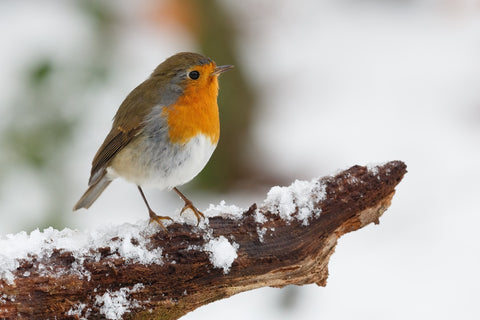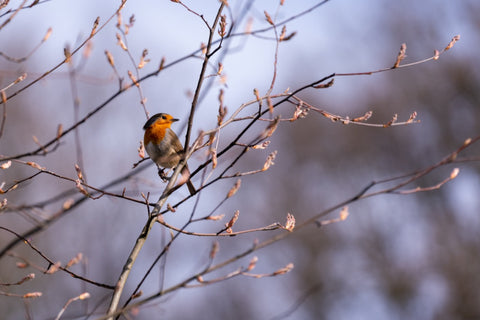The vital role of supporting birds during winter
As the crisp air of winter sets in and nature dons its frosty coat, the survival of our feathered friends becomes an increasingly pressing concern. Winter presents unique challenges for birds, from scarce food sources to harsh weather conditions. In this critical season, our gardens and outdoor spaces transform into vital havens for these winged beauties.

Understanding the importance of supporting birds in winter is more than just a gesture of kindness; it's a crucial step in maintaining the balance of our local ecosystems. Birds play a pivotal role in seed dispersal and pest control, contributing to the health and diversity of our environment.
However, their natural food sources dwindle during winter, making it arduous to find the necessary nourishment to survive the cold months.
This is where our role becomes instrumental. By providing a consistent and nutritious food supply through well-maintained bird feeders, we not only aid in their survival but also get the opportunity to observe and appreciate their beauty and behaviours up close.
In this blog, we'll delve into essential winter bird feeding tips, discuss choosing the best bird feeders for the season, and explore ways to create a bird-friendly environment in your backyard. Join us in this rewarding journey of supporting our winged companions through the winter months.
Challenges for birds in winter: Understanding their struggle for survival
With its serene blanket of snow and icy temperatures, winter can be a picturesque season for us. Still, it's a time of significant hardship and survival challenges for birds. The plummeting temperatures and shortened days bring forth a host of difficulties that these resilient creatures must navigate.
Scarcity of natural food sources
One of the most daunting challenges birds face in winter is the stark reduction in their natural food supply. Insects, a primary food source for many bird species, become scarce. Similarly, the berries, seeds, and fruits that form the diet of various birds are less abundant. This scarcity forces birds to expend more energy searching for food, even as their need for calories increases to combat the cold.
Harsh weather conditions
Winter weather can be unpredictable and extreme. Birds are subjected to freezing temperatures, snowstorms, and icy conditions, all posing significant risks. These conditions make it harder for birds to find food and water and increase their energy expenditure, as they must work harder to maintain body heat and navigate complex terrains.
Decreased shelter options
Many natural shelters, like dense foliage and underbrush, diminish in winter, leaving birds with fewer places to take refuge from the cold and predators. Finding a safe and warm place to roost becomes a critical yet challenging necessity.
The importance of human assistance
These winter hardships underscore the importance of our role in aiding birds. We can significantly alleviate these challenges by providing reliable food sources through well-stocked bird feeders and ensuring access to clean water. Additionally, offering shelter, such as birdhouses or leaving natural garden debris for cover, can provide essential refuge from the harsh winter elements.
Feeding tips: Nourishing our feathered friends in the cold
Winter transforms our backyards into critical sanctuaries for birds, and understanding the correct feeding practices is vital to their survival. Here, we'll share essential tips on what to feed birds during these colder months and how often to ensure they receive the necessary nourishment.
Opt for high-energy foods
Birds expend a lot of energy to stay warm in winter, so foods high in fat and calories are ideal. Black oil sunflower seeds, suet, and peanuts are excellent choices, providing a much-needed energy boost. Suet cakes, rich in fat, are particularly beneficial as they're easy for birds to eat and digest, especially in freezing temperatures.
Diversify the menu
Different bird species have varied dietary needs. Offering a variety of food types attracts a broader range of birds. Consider incorporating thistle seeds for finches, millet for sparrows, and nectar for overwintering hummingbirds. This diversity caters to different species and ensures a well-rounded diet.
Regular refilling is crucial
During winter, birds will rely on your feeders as a consistent food source. It's essential to regularly check and refill the feeders, especially after snowfalls or storms. A steady food supply helps the birds and encourages regular visits, providing a delightful bird-watching experience.
Maintain clean feeders
Cleanliness is vital in preventing the spread of diseases among birds. Regularly clean the feeders with a solution of one part bleach to nine parts water, rinsing thoroughly. Ensure the feeders are completely dry before refilling to prevent mould growth.
Provide fresh water
Water can be scarce in winter, so providing fresh, unfrozen water can be as important as feeding. A birdbath can offer birds a much-needed drink or a place to bathe, which is essential for feather maintenance.
Avoid overcrowding
If you notice your feeders needing to be more crowded, consider adding more feeders to reduce competition and stress among birds. This not only aids in better bird distribution but also reduces the spread of diseases.
Riverside Woodcraft's bird feeders – Your ally in winter bird care
As we delve into the importance of supporting our avian friends during winter, we must highlight the role of quality bird feeders. Riverside Woodcraft's range of bird feeders emerges as a perfect ally in this noble cause, combining functionality with aesthetic appeal to enhance your winter bird care routine.
Superior design for harsh weather
Riverside Woodcraft's bird feeders are crafted with durability in mind, especially suitable for withstanding winter's harsh conditions. Their robust construction ensures the feeders remain secure and accessible to birds, even amidst snow and strong winds. The thoughtful design prevents snow accumulation and allows easy access to the seeds, making them an ideal choice for year-round use.
Variety to suit different bird species
Understanding that different bird species have varying feeding preferences, Riverside Woodcraft offers a diverse range of feeder types. From traditional seed feeders and suet ball holders to nectar feeders and peanut dispensers, each style is designed to cater to the specific needs of different birds. This variety ensures that a wide range of species can find sustenance in your garden during winter.
Easy to clean and maintain
These feeders are designed for easy maintenance in line with the essential need for cleanliness in bird feeding. Their user-friendly structure allows for quick cleaning and refilling, ensuring you can keep the feeders hygienic and well-stocked with minimal effort. This is crucial in preventing the spread of diseases among birds, particularly in the colder months.
Aesthetically pleasing and environmentally friendly
Not only are these feeders effective in attracting and nourishing birds, but they also add an aesthetic touch to any garden. Made with environmentally friendly materials and available in various designs, they blend seamlessly into different outdoor settings while supporting sustainable practices.
Encouraging eco-conscious bird-watching
By choosing Riverside Woodcraft's bird feeders, you're providing a lifeline for birds in winter and embracing an eco-conscious approach to bird watching. These feeders encourage the local bird population to thrive, allowing you to enjoy the beauty of nature right from your backyard, all while contributing positively to the environment.
Ensuring your bird feeders are winter-ready
Maintaining bird feeders in winter is not just about refilling them; keeping them clean and safe is crucial to ensure the health and safety of your feathered visitors. Here, we provide some essential tips on maintaining your bird feeders during the colder months, making them a reliable and hygienic haven for birds.
Regular cleaning is key
In winter, bird feeders can become breeding grounds for bacteria and mould due to damp conditions. Regular cleaning, ideally every two weeks, is essential. Use a solution of warm water and mild soap or a diluted bleach solution (one part bleach to nine parts water) to thoroughly clean the feeders. Rinse well to ensure no residue is left behind.
Monitor for damage
Inspect your feeders frequently for wear or damage, especially after heavy snow or winds. Cracks or breaks can not only make the feeder less effective but also potentially harmful to birds. Ensure that all parts are secure and functioning correctly.
Keep the area around feeders clean
Spilt seeds and husks can attract unwanted pests and can become mouldy. Regularly clear away any debris around the feeder area. This helps maintain hygiene and reduces the spread of disease among bird populations.
Safeguard against predators
Position your feeders in places that are less accessible to predators like cats. Also, consider installing a baffle to prevent squirrels from accessing the feeder, ensuring the food is reserved for birds.
Refill with fresh food
Continually replenish the feeders with fresh food. Discard any old or wet seeds to prevent mould and bacterial growth. New, dry grains are crucial for the birds' health in winter.
Join the effort to support winter wildlife
As we wrap up our journey through the essentials of winter bird care, it's clear that our feathered friends face numerous challenges during the colder months. But we can make a significant difference in their lives with a little effort and the right resources. Now is the perfect time to step up and become a guardian of wildlife right in your own backyard.

Make a difference with Riverside Woodcraft's bird feeders
Investing in a high-quality bird feeder from Riverside Woodcraft is more than just a purchase; it's a step towards fostering a thriving bird community. Our range of durable, eco-friendly, and aesthetically pleasing bird feeders is designed to cater to the diverse needs of different bird species, ensuring they have a reliable source of nourishment throughout winter.
Easy steps for significant impact
Remember, every bird feeder set up is a beacon of hope for birds braving the winter. By providing a safe feeding station, you're aiding in bird conservation and getting the chance to observe and connect with nature like never before. The joy and satisfaction of watching a lively bird community in your garden are unmatched.
Visit Our Product Page for the Ideal Feeder
Ready to make a difference? Explore our extensive collection of bird feeders and find the perfect match for your garden. Whether you're a seasoned bird enthusiast or just starting, we have something for everyone. Visit our bird feeder product page to browse our selection and take the first step in becoming a winter wildlife hero.
Let's create a haven for birds this winter and enjoy the beauty and diversity they bring to our lives. Your contribution matters; every feeder set-up is a step towards a more bird-friendly world.










